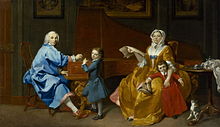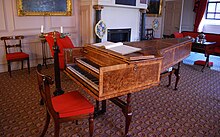Burkat Shudi
Burkhardt Tschudi ( born March 13, 1702 Schwanden; † August 19, 1773 in London, English: Burkat Shudi ) was a British harpsichord maker of Swiss origin and father of the founder of the piano manufacturer Broadwood and Sons.
Life and work
Burkhardt Tschudi was born as the son of the wool merchant, surgeons and alderman Joshua Tschudi Elmer in the "Color " in Schwanden. After an apprenticeship as a carpenter, he was the age of sixteen on tour and took place in London at the country's leading harpsichord maker Hermann Tabel employment. Tschudi appropriated many techniques of his master, and yet during the 1720s, he managed to enter the English society, thanks to two special sponsors: Johann Jacob Heidegger, director of the Opera House, and George Frideric Handel, since 1719 director of the Royal Academy of Music under King George I. Handel visited Tschudi, 1728 in the Soho district of independently made and anglifizierte his name in Burkat Shudi, and often gave him the contact with the Italian singer Anna Maria Strada, which he, a harpsichord with the signature " Burckart Tschudi, Londini fecit 1729 " built. In the same year Shudi thanks Handel's intercession could also provide a harpsichord to the Prince of Wales and therefore introduced the " Plume of Feathers " as a company sign and called himself as a purveyor " Harpsichord -maker to his Royal Highness the Prince of Wales".
In 1728 he married Catherine and Wild ( 1707-1758 ), who had emigrated with her parents from Schwanden to London before Tschudi, and they founded with her dowry the business. With her he had eleven children. 1759 Shudi married for the second time and got the Swiss Elizabeth Meyer another daughter. After the spaces in the Meards Street No. 1 were too small Shudi moved the shop in 1739 in the Great Pulteney Street No. 32 Since in this district, other instrument makers and musicians of London settled, the Alsatian Jacob Kirkman, who had married the tables widow, and violinist John Clegg, have after an utterance of violinist Michael Christian Festing, " the district under the strings vibrations vibrates ".
Shudi won two important employees. Johann Christoph Zumpe (1735-1800) had been an apprentice of Gottfried Silbermann and emigrated in the 1750s from England. There he worked for Shudi before 1761 at the Hanover Square independently made under the sign of the " Golden Guittar ". John Broadwood ( born October 6, 1732 in Cockburnspath, † July 17, 1812 in London) since 1761 and had worked for Shudi on January 2, 1769 Shudis youngest daughter Barbara (* 1749, † July 8, 1776 ) married.
Shudis real achievement was the invention of the " Venetian sill ," which was a " swell " also introduced shortly after the organ building, with a pedal mechanism the volume of the game could be affected. "Here opens with the strings a whole system of parallel blinds, which are moved by the pedal slowly and, thus strengthen and weaken the tone ". 1764 Shudi built a harpsichord for the Prussian King Frederick II, which tried the members of the London Mozart family was staying in advance. Broadwood and Shudi had first to be installed in the instrument sills and damper pedals; a then advanced type of mechanism, in which the pianist could regulate loud and soft playing better. Frederick II 've owned several Tschudi harpsichord.
Son Burkhat (1738-1803) and daughter Barbara and her husband John Broadwood took over on March 7, 1771 CEO, from 1782 on Broadwood 's sole director. With the death of the company founder in 1773, the company went on to Burkhat, Barbara and John. 1771 Broadwood presented his first square piano on the model of John Zumpe ago. Presented Shudi and Broadwood beginning of the 1770s fourteen harpsichords a year ago, so tenfold Broadwood production until 1784. Broadwood then moved production to the piano and found the mid- 1790s the production of a harpsichord. The grandson Tschudi, James Shudi Broadwood, still bore the name Tschudi.
Both Mozart and Joseph Haydn, who often frequented the family Tschudi in London, have played on Shudi - Broadwood instruments. Another Shudi instrument was shipped to the British Consul Joseph Smith to Venice. His widow Elizabeth took the instrument in 1778 again returned to Bath, and after her death, " a well- sounding harpsichord with two keyboards of Shudi with pedals " was sold at auction on April 9, 1789 at Christie's in London.
It can now be detected even 23 harpsichords of Tschudi. One of them is in Tschudi's home, in Freulerpalast Naefels. A two-manual instrument, built in 1766 and a gift to the Prussian King Frederick II, located in the Lower concert room (room number 161) of the Lower Prince neighborhood in the north wing of the castle in Potsdam Neues Palais.










